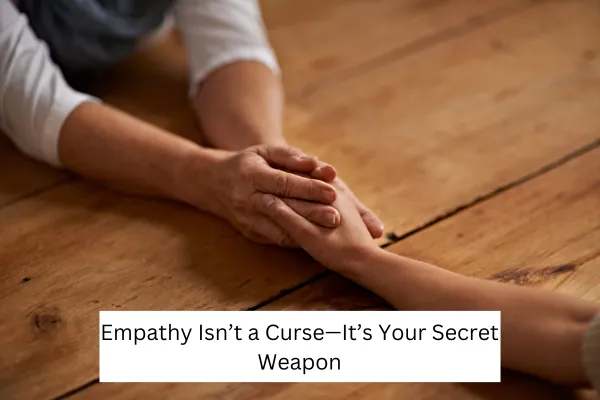Welcome To The Official Blog Of The
🎊 Attractive Relationships Podcast 🎊

Empathy Isn’t a Curse—It’s Your Secret Weapon
In a world that feels increasingly disconnected, one thing sets some people apart: empathy. Maybe you’ve been told you’re “too sensitive” or that you “care too much.” Perhaps you’ve felt like your ability to step into someone else’s shoes is more of a burden than a gift. But let me tell you something—it’s not a curse. In fact, it’s your secret weapon.
Let’s break it down.
Why Empathy Feels Draining
If you’re someone who naturally tunes into other people’s emotions, you might find yourself exhausted after conversations. It’s like people sense your kindness and flock to you, hoping you’ll understand their pain. And while that connection can be fulfilling, it can also leave you feeling empty, wondering when someone will offer you the same level of care.
But here’s the truth: your empathy isn’t just rare—it’s powerful. The key is learning how to use it intentionally, without letting it consume you.
Tactical Empathy: A Better Way to Connect
In the book Never Split the Difference, former FBI hostage negotiator Chris Voss introduces a concept called “tactical empathy.” At first, the term might sound a little manipulative, as if empathy were being used as a tool to control others. But when you dig deeper, you realize it’s about precision—showing people that you don’t just hear them, but truly understand them.
Think back to math class (stay with me here). Remember when your teacher wouldn’t just accept the right answer? You had to show your work. That’s what tactical empathy is in conversations. It’s not enough to say, “I understand.” You have to prove it.
Here’s an example: Imagine a friend comes to you after a bad breakup. They’re venting about being betrayed. Instead of offering a generic “That sucks,” you validate their emotions: “What a terrible thing to go through. You must feel so hurt and angry right now.” Chances are, they’ll respond with something like, “Yeah, exactly!” That’s because you’ve shown them you truly get it.
Empathy as Influence
When you show your work in conversations, something magical happens. You create a safe space. People feel seen, heard, and valued—and that’s when they’re most open to new ideas, solutions, or even your advice.
This isn’t just useful in personal relationships. Empathy can transform your career. Whether you’re leading a team, negotiating with a client, or building a business, the ability to connect deeply with others is a game-changer.
Consider leaders and storytellers who captivate their audiences. They aren’t shouting the loudest or trying to dominate the room. They’re connecting through empathy, using it to inspire and influence without being overbearing.
How to Protect Your Empathy
Of course, empathy can’t be all give and no take. In a previous podcast episode, we talked about the importance of setting boundaries to avoid burnout. Being empathetic doesn’t mean you have to say “yes” to everything or let people take advantage of your kindness.
Start by recognizing your limits and communicating them clearly. Remember, your well-being matters too. You can’t pour from an empty cup, no matter how big your heart is.
Turning Empathy into Your Superpower
So, how do you make empathy work for you? Here are a few practical steps:
Practice Tactical Empathy
Focus on showing your work in conversations. Validate emotions and reflect understanding.Set Boundaries
Know when to step back to protect your energy. Empathy without boundaries leads to burnout.Leverage Your Gift
Use empathy to connect and influence in your relationships, career, and personal life.Keep Learning
Books like Nonviolent Communication by Marshall Rosenberg and Never Split the Difference by Chris Voss offer invaluable insights into the power of empathy.
Empathy Changes Everything
Your ability to empathize is one of the most valuable tools you have. It’s not just about helping others—it’s about creating meaningful connections that can transform your relationships, career, and life.
The world needs more people like you—people who listen, who care, and who make others feel seen. Don’t let that gift go to waste.
So, next time you feel like empathy is a burden, remember this: it’s not. It’s your superpower. Use it wisely, and watch how it changes everything.
